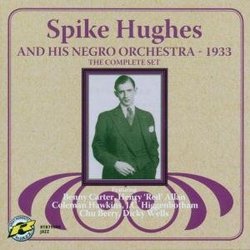| All Artists: Spike Hughes, Benny Carter Title: 1933 Members Wishing: 0 Total Copies: 0 Label: Challenge Release Date: 5/9/2006 Genres: Jazz, Pop Style: Number of Discs: 1 SwapaCD Credits: 1 UPC: 608917900514 |
Search - Spike Hughes, Benny Carter :: 1933
 | Spike Hughes, Benny Carter 1933 Genres: Jazz, Pop
|
Larger Image |
CD Details |
CD ReviewsHughes' swan songs JJA Kiefte | Tegelen, Nederland | 01/15/2009 (5 out of 5 stars) "Patrick "Spike" Hughes was a man of many talents, and these sides he cut for Decca / Brunswick in New York with an all star band (its members drawn from Luiz Russel's, Benny Carter's and Fletcher Henderson's orchestras) attest to the most memorable: composer arranger and leader. Hughes had recorded small band sides in Britain, worked as a conductor arranger and bassist and after a particularly busy season in 1933 he went on holiday to the USA where he stayed with the influential John Hammond (who a.o. put Benny Goodman, Count Basie, Billie Holiday and Teddy Wilson on their way to fame). Here germinated the idea to assemble a band containing the cream of (black) jazz musicians and record some sides. At three separate sessions fourteen sides were cut, most of them original Hughes compositions. The personel reads like a veritable who-is-who, Coleman Hawkins, Chu Berry, Benny Carter, Henry "Red" Allen, Dickie Wells and Sid Catlett being the most famous. All rise to the occasion playing the often intricate arrangements with gusto and making the most of the generous solo space they are accorded. The material ranges from down to earth hot music like "Bugle Call Rag", "Someone Stole Gabriel's Horn", "Firebird" and "Sweet Sue" (the latter by a small contingent) to beautiful atmospheric gems: "Fanfare", "Pastorale", "Arabesque" and the splendid "Donegal Cradle Song" (recorded some 15 years later by Ted Heath in one of his most sumptuously arranged ballad outings). Hughes quit playing and arranging jazz after this, commenting that "anything that came later would be an anti-climax". The remainder of the disc is filled by nine items by Benny Carter's orchestra, which are very good too, featuring a very young Teddy Wilson and Wayman Carver's flute (also present on the Hughes sides) a pity that Carter's own contributions are very short. The music on this disc still sounds very fresh, vigorous, swinging and even modern (compared e.g. with Casa Loma's or Isham Jones's more vertical and frenetic (although very well played) outings from around the same period, which generally have dated much more) and should be included in the discography of anyone seriously interested in the development of jazz." A Major Achievement jive rhapsodist | NYC, NY United States | 11/05/2009 (5 out of 5 stars) "Let's first talk about the mastering - one can compare this brilliant job by John R. T. Davies to that done by any number of other excellent engineers (Lionel Risler, for example, on the Masters of Jazz Benny Carter set). And what is amazing is the amount of grime that Davies has been able to remove. Some pieces almost sound like alternate takes - the sonic atmosphere is so different from what I've become accustomed to. The music is ALIVE in a way previously only accessible to those who have a collection of mint - condition 78s (and the proper player, naturally). Hughes' work can now be seen in its proper light. He decided to become a Jazz composer, when there were few of those. Somehow, he believed that his particular understanding of Ellington justified his coming to New York from London and recording with some of the greatest Black musicians of that time without seeming like some ridiculous parvenu. And he was right. These pieces have an incredible sophistication for the time - especially in terms of the use of dynamics. And the musicians (Dicky Wells, Coleman Hawkins, Benny Carter, Henry Red Allen, etc.) rise to the occasion. They seem to have really appreciated the challenges presented by this music. Occasionally the seams show - Swing and swinging are not things that you LEARN, exactly. And Hughes' idiom is not totally idiomatic. There is stiffness, there is overwriting. But there is also (Nocturne, Pastoral, Music at Midnight, Sweet Sorrow Blues) some of the most beautiful Jazz writing of the time. Maybe this was MEANT to be a one-shot by a talented amateur with a limited amount to say. But, hey, he said it - and 75 years later, we're still listening."
|

 Track Listings (23) - Disc #1
Track Listings (23) - Disc #1